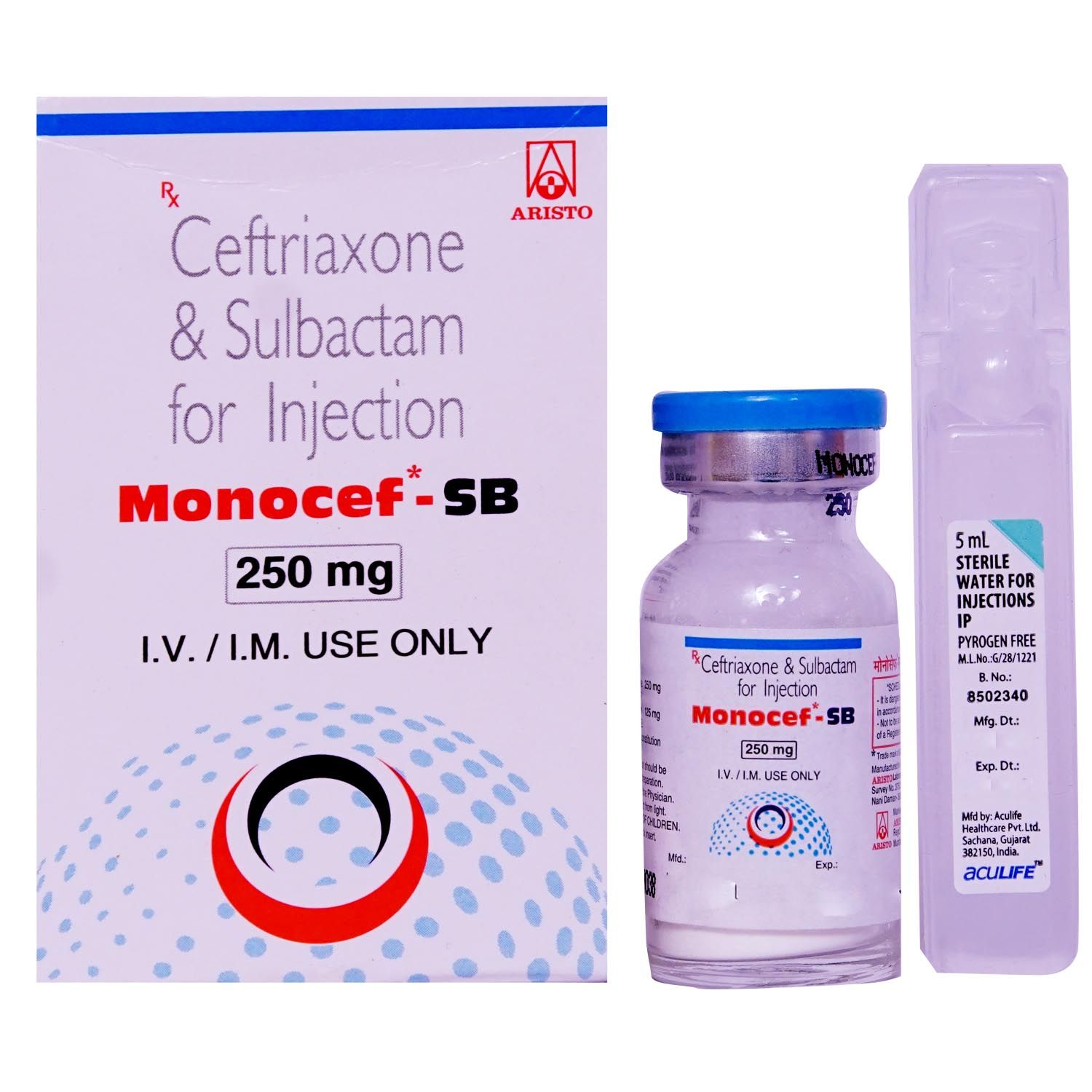Ricxone S 250mg/125mg Injection
₹42.3*
MRP ₹47
10% off
₹39.95*
MRP ₹47
15% CB
₹7.05 cashback(15%)
Free Delivery
With Circle membership
(Inclusive of all Taxes)
This offer price is valid on orders above ₹800. Apply coupon PHARMA10/PHARMA18 (excluding restricted items)
Know Your Delivery Time
Provide Delivery Location

Whats That

Secure Payment

India's Most Trusted Pharmacy

Genuine Products
Composition :
Consume Type :
Return Policy :
About Ricxone S 250mg/125mg Injection
Ricxone S 250mg/125mg Injection belongs to the class of medications called ‘antibiotics’ used to treat bacterial infections. Bacterial infections are caused by the multiplication of harmful bacteria inside or on the body. These harmful bacteria produce chemicals known as toxins, which can damage tissue and make you sick. Symptoms of bacterial infection vary depending on the organ affected by bacteria.
Ricxone S 250mg/125mg Injection is a combination of two medicines: Ceftriaxone and Sulbactam. Ceftriaxone is a cephalosporin antibiotic. It has bactericidal action (kills bacteria). It works by preventing the formation of the cell wall (the outer protective layer of bacteria, which is essential for its survival) by preventing protein synthesis. Sulbactam inhibits the action of beta-lactamase. Beta-lactamase is an enzyme produced by bacteria that can destroy antibiotics (ceftriaxone).
Ricxone S 250mg/125mg Injection will be administered by a healthcare professional, so do not self-administer. The common side effects of Ricxone S 250mg/125mg Injection include pain and swelling at the injection site, skin rash, diarrhea, nausea, vomiting and black/tarry stools. These side effects are usually mild and temporary. However, if these side effects persist or worsen, inform your doctor immediately.
It is not recommended to take Ricxone S 250mg/125mg Injection if you are allergic to penicillin or any cephalosporin antibiotic or its contents. Before taking Ricxone S 250mg/125mg Injection, inform your doctor if you have kidney problems, liver disease, diabetes or using other antibiotics. Do not discontinue or abruptly stop using Ricxone S 250mg/125mg Injection as it may lead to antibiotic resistance (bacteria become resistant to antibiotics). Before taking Ricxone S 250mg/125mg Injection, inform your doctor if you have an electrolyte imbalance, seizures, or gastrointestinal diseases. Ricxone S 250mg/125mg Injection is probably safe when used in children, pregnant women, breastfeeding mothers and the elderly. Ricxone S 250mg/125mg Injection may not interact with alcohol. Ricxone S 250mg/125mg Injection may cause dizziness, so do not drive or operate heavy machinery if you feel dizzy.
Uses of Ricxone S 250mg/125mg Injection
Medicinal Benefits
Ricxone S 250mg/125mg Injection contains Ceftriaxone and Sulbactam. Ceftriaxone is a cephalosporin antibiotic, whereas Sulbactam is a beta-lactamase inhibitor. Ricxone S 250mg/125mg Injection has broad-spectrum activity and is effective against both gram-positive and gram-negative bacteria. It makes the drug effective in multiple serious bacterial infections, including infections of the bloodstream (septicemia), bones (osteomyelitis), the heart valves (endocarditis), the membranes protecting the brain (meningitis), acute bacterial otitis media (infection of the middle ear) and the lining of the abdomen (peritonitis) and to prevent and treat infections following surgeries.
Side Effects of Ricxone S 250mg/125mg Injection
- Pain at the injection site
- Swelling at the injection site
- Skin rash
- Diarrhoea
- Anaphylaxis
- Elevated liver enzymes
- Nausea
- Vomiting
- Black/tarry stools
Directions for Use
Storage
Drug Warnings
It is not recommended to take Ricxone S 250mg/125mg Injection if you are allergic to penicillin, any cephalosporin antibiotic, or its contents. Before taking Ricxone S 250mg/125mg Injection, inform your doctor if you have kidney problems, liver disease, diabetes or using other antibiotics. Do not discontinue or abruptly stop using Ricxone S 250mg/125mg Injection as it may lead to antibiotic resistance (bacteria become resistant to antibiotics). Before taking Ricxone S 250mg/125mg Injection, inform your doctor if you have an electrolyte imbalance, seizures, or gastrointestinal diseases. Ricxone S 250mg/125mg Injection is probably safe when used in children, pregnant women, breastfeeding mothers and the elderly. Ricxone S 250mg/125mg Injection may not interact with alcohol. Ricxone S 250mg/125mg Injection may cause dizziness, so do not drive or operate heavy machinery if you feel dizzy. Alterations in prothrombin time (a test used to check for bleeding problems) have been reported in patients receiving this medicine. Antibiotic therapy will cause an imbalance in the normal microbial flora of the large intestine, which may promote the growth of a bacteria called Clostridium difficile, and you may experience severe diarrhoea.
Therapeutic Class
Diet & Lifestyle Advise
- Probiotics should be taken after taking the full course of Ricxone S 250mg/125mg Injection to restore some healthy bacteria in the intestines that may have been killed. Taking probiotics after antibiotic treatment can reduce the risk of antibiotic-associated diarrhoea. Certain fermented foods like yogurt, cheese, sauerkraut, kombucha and kimchi can help restore the intestine's good bacteria.
- Include more fibre-enriched food in your diet, as it can be easily digested by gut bacteria, which helps stimulate their growth. Thus, fibre-rich foods may help restore healthy gut bacteria after antibiotics. Whole grains like whole-grain bread and brown rice should be included in your diet.
- Avoid alcoholic beverages with Ricxone S 250mg/125mg Injection as they can make you dehydrated and may affect your sleep. This can make it harder for your body to aid the Ricxone S 250mg/125mg Injection in fighting off infections.
Habit Forming
How Ricxone S 250mg/125mg Injection Works
What if I have taken an overdose of Ricxone S 250mg/125mg Injection
Alcohol
Caution
It is advisable to avoid alcohol consumption to prevent unintended side effects.
Pregnancy
Caution
Ricxone S 250mg/125mg Injection is not recommended for use in pregnancy unless absolutely necessary. Inform your doctor if you are pregnant. Your doctor may prescribe this medicine if the benefits outweigh the risks.
Breast Feeding
Caution
Ricxone S 250mg/125mg Injection is not recommended for use in breastfeeding unless absolutely necessary. Inform your doctor if you are breastfeeding. Your doctor may prescribe this medicine if the benefits outweigh the risks.
Driving
Caution
Ricxone S 250mg/125mg Injection may decrease your alertness and vision or make you sleepy and dizzy. Do not drive if these symptoms occur after receiving this medicine.
Liver
Caution
Ricxone S 250mg/125mg Injection should be used with caution if you have liver function impairment due to the increased risk of worsening your condition. Regular monitoring of liver function tests, appropriate dose adjustments or replacement with a suitable alternative medicine may be required in some cases based on your clinical condition.
Kidney
Caution
Ricxone S 250mg/125mg Injection should be used with caution if you have a history of renal function impairment due to the increased risk of severe side effects. Close monitoring of kidney function, appropriate dose adjustments or replacement with alternative medicine may be required in some cases based on your clinical condition.
Children
Caution
Ricxone S 250mg/125mg Injection is probably safe when used in children. However, your doctor may adjust the dose based on age, body weight and health condition of your child.
Country of origin
Author Details
We provide you with authentic, trustworthy and relevant information
FAQs
Disclaimer
Product Substitutes








